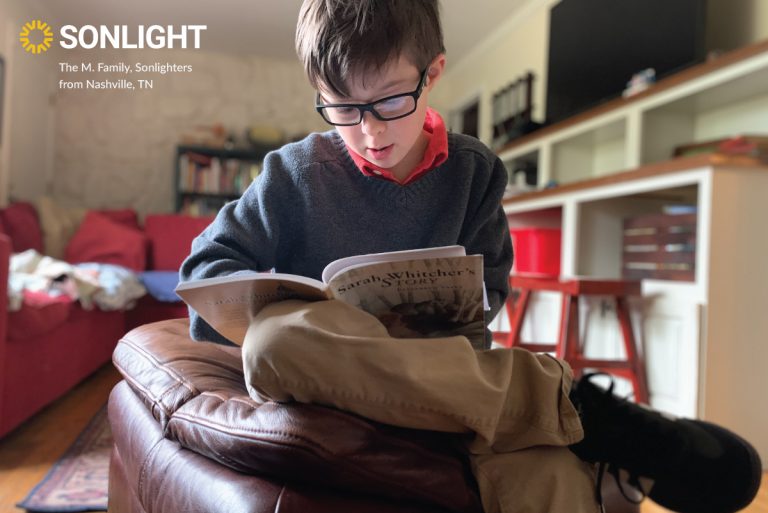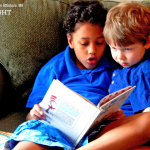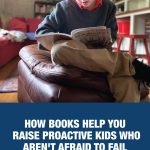Nine-year-old Betsy was set up to fail. Primped and pampered her whole life, she had never done a chore or fixed her own hair. When circumstances changed and Betsy went to live with cousins on a Vermont farm, her new family expected her to pitch in and help. Naturally, Betsy made mistakes as she tried new skills and adjusted to her new life.
But her story doesn't end in failure.
If you've read Understood Betsy from History / Bible / Literature B, you know that Betsy blooms as she learns new skills and discovers she's capable of far more than she ever thought. The country air and some reasonable hard work only make her happier, stronger, and more confident.
As Betsy exemplifies, failure is a perfectly natural part of learning and growth. We all know this intellectually. But we live in a society that places a big stigma on failure.
As parents, we need to teach our kids how to fail well and not to fear failure.
I actually think homeschooling can provide the perfect environment for kids to stretch their wings, try new things, fail, and succeed.
Homeschooling Provides an Environment Where Kids Can Safely Fail and Try Again
Compare this to a school setting. In many schools, children receive a grade on every bit of work they complete. When every math assignment comes back with red ink and a score that counts toward a final semester grade, how much pressure does that put on kids to succeed every time? I wonder if this pushes kids to either become obsessed with perfection or just stop caring. I certainly don't think it encourages kids to try things at which they might not succeed. It reminds me of an article about the inverse power of praising your children. If they know they won't get a perfect score, why even try?
But homeschooled kids can learn through mastery. They can try new things without the constant pressure of a grade stamped on their paper. They can mess up their math problems and then stick with the concept until they actually learn it. As my son Luke explains so well, failure is okay on the road to mastery.
Homeschooled children have free time to take up computer programming, art, video production, cooking, or a thousand other interests that all require trying, failing, and trying again. And they can do this without the constant pressure of grades on each assignment.
In society at large, failure of any sort can carry a huge stigma. May we instead teach our children that failure is not the end of the story. Just like Betsy, let's help them learn how to fail … and then how to keep on trying.
Books with Characters Who Fail and Learn
Sonlight books show how failure and learning go together. Believe it or not, I consider a book's perspective on failure when I determine what to include in Sonlight's curriculum. I don't choose books where the characters are perfect. I avoid stories where children always make the best decision and only do things at which they know they'll excel.
I choose books where the kids, like Betsy, seem real. They face challenges and try new things. Not surprisingly, they often fail at those new things. (Ever taught a child to ride a bike? There's lots of failure involved before the successful takeoff!) But Sonlight characters keep trying, go on to learn valuable lessons, and ultimately make a difference in their world.
I think of books like
- Carry On, Mr. Bowditch from HBL D
- The Hundred Dresses from HBL A
- Call it Courage from HBL F
- Jacob Have I Loved from Literature 430
- My Father's Dragon from HBL K
- Sticks Across the Chimney from HBL C
- Rickshaw Girl from HBL F
- Caddie Woodlawn from HBL E
and so many other Sonlight books. They feature strong kids who don't just sit back and let life happen to them.
The characters are most certainly not perfect in these books. But they do persevere, develop virtue, gain new skills and become heroes in their own way by the end of the story.
Sonlight Characters as Models of Proactive Strength
Do you remember the scene where Caddie Woodlawn skates out onto the thin ice? Of course, she falls through and a fun adventure turns into an emergency. With no time to call an adult for help, her brother Tom snaps into action and rescues her.
How do we raise children to be proactive in times of need? How can we help them learn to use their own strength, wits and gifts?
I just finished About Average, the new book by Andrew Clements. In line with The School Story and Frindle, Clements presents a main character who doesn't just react to situations. Jordan Johnston thinks about how she wants to live … and then lives it! Because of her daily choice to be proactive, she's ready for action when a big need comes.
Of course, Jordan doesn't think she's doing anything special. Her friends seem to have amazing talents, but she feels very ordinary. The real key for Jordan is that she does not just sit by passively. She tries lots of different activities to see what she enjoys. She soaks up any chance to learn new things. When a classmate starts to pick on her, Jordan chooses to respond with kindness. Without realizing it, Jordan cultivates all sorts of skills and virtues.
And in the end, when a terrifying tornado heads straight for the school, Jordan has already practiced taking charge and stepping up. All of the skills she's learned throughout the book come into play. She uses those skills and ingenuity and ends up saving her classmates.
The ending may be a bit far-fetched, but the message is true: Ordinary kids can think about their world and solve problems without waiting for an adult to tell them exactly what to do. They can act without being paralyzed by fear of failure.
I believe that books like these can inspire our children to live intentionally (under the protection and day-to-day guidance of their parents, of course). Such stories provide models of ordinary, imperfect children who take responsibility for their actions and choose how to live.
That's why I include books in Sonlight programs where kids think, plan and solve problems—strong kids who don't just sit back and let life happen to them. Sometimes the characters fail. But they always grow as a result. May these stories inspire our children to do great things!










[…] how God has provided in the past. My mom has written some excellent posts on this subject, such as Teaching children how to fail and Why Sonlight shows students that the world isn't perfect. These kinds of examples -- which can […]